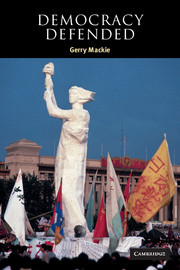Book contents
- Frontmatter
- Contents
- List of figures
- List of tables
- Acknowledgments
- 1 A long, dark shadow over democratic politics
- 2 The doctrine of democratic irrationalism
- 3 Is democratic voting inaccurate?
- 4 The Arrow general possibility theorem
- 5 Is democracy meaningless? Arrow's condition of unrestricted domain
- 6 Is democracy meaningless? Arrow's condition of the independence of irrelevant alternatives
- 7 Strategic voting and agenda control
- 8 Multidimensional chaos
- 9 Assuming irrational actors: the Powell amendment
- 10 Assuming irrational actors: the Depew amendment
- 11 Unmanipulating the manipulation: the Wilmot Proviso
- 12 Unmanipulating the manipulation: the election of Lincoln
- 13 Antebellum politics concluded
- 14 More of Riker's cycles debunked
- 15 Other cycles debunked
- 16 New dimensions
- 17 Plebiscitarianism against democracy
- 18 Democracy resplendent
- Endnotes
- References
- Index
10 - Assuming irrational actors: the Depew amendment
Published online by Cambridge University Press: 22 September 2009
- Frontmatter
- Contents
- List of figures
- List of tables
- Acknowledgments
- 1 A long, dark shadow over democratic politics
- 2 The doctrine of democratic irrationalism
- 3 Is democratic voting inaccurate?
- 4 The Arrow general possibility theorem
- 5 Is democracy meaningless? Arrow's condition of unrestricted domain
- 6 Is democracy meaningless? Arrow's condition of the independence of irrelevant alternatives
- 7 Strategic voting and agenda control
- 8 Multidimensional chaos
- 9 Assuming irrational actors: the Powell amendment
- 10 Assuming irrational actors: the Depew amendment
- 11 Unmanipulating the manipulation: the Wilmot Proviso
- 12 Unmanipulating the manipulation: the election of Lincoln
- 13 Antebellum politics concluded
- 14 More of Riker's cycles debunked
- 15 Other cycles debunked
- 16 New dimensions
- 17 Plebiscitarianism against democracy
- 18 Democracy resplendent
- Endnotes
- References
- Index
Summary
Introduction
Riker wants to demonstrate, with a story about the Senate deliberations on the 17th Amendment to the US Constitution, that manipulation by introduction of new alternatives is typical of democratic politics. The 17th Amendment would establish the direct election of US senators. Riker claims that in 1902 Chauncey Depew, a senator from New York, added a voting-rights rider to the direct-election proposal that introduced a disequilibrium. Depew is alleged to have contrived a cycle that prevented action on the direct election question for nine years, until 1911. I provide historical background on the election of senators controversy. I offer an alternative analysis, which shows that there was no cycle in 1911 and hence no cycle in 1902. The 17th Amendment failed to pass the 61st Senate early in 1911 due to lack of sufficient votes for either the version with another voting-rights rider or the version without such a rider, not due to a cycle. The 17th Amendment passed the 62nd Senate later in 1911 due to the election of new senators who supported the Amendment. Altogether, I identify 11 errors of fact and interpretation in Riker's account.
Riker's tale
Although there may be equilibria in politics, they are extremely fragile to manipulation by the introduction of new alternatives, because of the McKelvey–Schofield findings about the indeterminacy of outcomes in multidimensional issue space, according to Riker (1982, 192).
- Type
- Chapter
- Information
- Democracy Defended , pp. 217 - 240Publisher: Cambridge University PressPrint publication year: 2003

